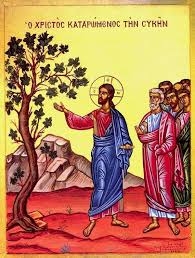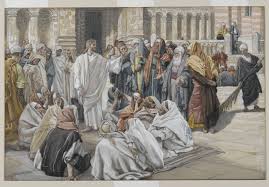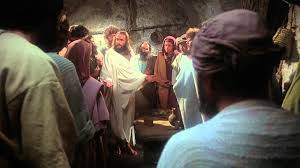I’m posting short daily commentaries on the Holy Week services. I hope this will be of help to the many of us (including me) who can’t get to church this week. These Posts are based on Holy Week homilies I’ve given at Saint Nicholas, Cedarburg, over the last thirty years.
First take out your Bible and read the Gospel passage below, since I’ll now do a lot of paraphrasing of the actual text.
Gospel reading: Matthew 21:18-43
Why, this week, do we have Orthros (a morning service) in the evening, and Presanctified Liturgy (an evening service) in the morning? The answer: “Don’t ask.” I have occasionally invented explanations, but I don’t know. Do any readers have the answer?
Why is this called “Bridegroom” Matins? Because of the hymn we sing four evenings this week, which derives from the Tuesday morning Gospel reading – about the ten bridesmaids waiting for the bridegroom who arrives late, in the middle of the night”. In the middle of the night on Pascha, Christ the Bridegroom will rise from death, to be “married”, united with his bride the Church, with us forever. Thus, before He comes again in Glory, Be prepared.
In tonight’s Gospel it is Monday morning. Jesus and His disciples had stayed overnight with Martha, Mary and Lazarus in Bethany. It says he was hungry. (For once Martha must not have  fixed a meal!) Jesus saw a fig tree with no fruit on it, and He cursed it. Matthew says it immediately withered. Mark says that evening on the way back they found it withered.
fixed a meal!) Jesus saw a fig tree with no fruit on it, and He cursed it. Matthew says it immediately withered. Mark says that evening on the way back they found it withered.
Why would the Lord do that to an innocent tree? As a symbol of the results of not “bearing fruit”. (He’ll use other images for this in other parables this Week.) The key is in the next line: “If you have faith you can say even to this mountain ‘Be cast into the sea’ and it will happen.” What was the mountain in front of them? Mount Zion, now called the “temple mount”, the center of Judaism. They would now reject Jesus their Messiah and be “cast into the sea”, so to speak. The Jewish nation would wither and be gone like the fig tree.
When they got to Jerusalem, Christ described the destruction of Jerusalem and the Jewish nation by the Roman army which would take place forty years later. We’ll hear more about that at morning services early this week.
He came to the temple. The authorities now began a coordinated last attempt to take Him down, this “fake Messiah”, lest he lead a rebellion and the nation be destroyed. They perhaps viewed Him (at first) as a sort of shallow up-country “reub”, to use popular America nomenclature. They soon discovered He was not.
So came the questions: “Who gave you authority to do these things?” Christ very smoothly turned it on them: “I will tell you if you first answer me a question. Was the Baptism of John from God or from men?” They hesitated. If we say from men, the people will turn on us for they revered John. But we can’t say from God because John said Jesus was the Messiah. They answered, “We do not know”. Jesus responded, “Then neither will I tell you by what authority I do these things”. Their attempt didn’t work.
Tonight we hear only a little of confrontation, more of which we’ll get tomorrow evening. There is no reason to think that the Gospels give us the whole of it.
 At the end of it all, Jesus took charge of the questioning: A man told his sons to go work in his vineyard. One said Yes but didn’t do it. The other said No but did it. Which did his father’s will? That was obvious: the one who said No but did it. Jesus responded: I say to you, You say Yes to God, you practice your religion, but when John came and spoke the truth about me you rejected him – while the sinners, tax collectors and harlots who aren’t “religious”, who say No to God, they believed John. Despite all your pious words you are not doing God’s will.
At the end of it all, Jesus took charge of the questioning: A man told his sons to go work in his vineyard. One said Yes but didn’t do it. The other said No but did it. Which did his father’s will? That was obvious: the one who said No but did it. Jesus responded: I say to you, You say Yes to God, you practice your religion, but when John came and spoke the truth about me you rejected him – while the sinners, tax collectors and harlots who aren’t “religious”, who say No to God, they believed John. Despite all your pious words you are not doing God’s will.
Then came Christ’s parable of the vineyard, which was an Old Testament symbol of the Jewish nation. The Landowner who established their nation and then went off to a far country is God. The vinedressers are the Jews. God sent his servants to collect the fruits, but they beat some, killed others. These were the prophets. Now the parable moves into the present: Finally the Landowner sent his Son, and they killed him. So what will the Owner do to those vinedressers? His hearers didn’t catch on that this was about them. They answered: He will destroy them and give the vineyard to others who will give him the fruits. Jesus said: “I tell you, the Kingdom of God will be taken away from you and given to a nation which will produce the fruits of it.”
And so it was: The rulers of old Israel arranged the murder of the Son of God, their own Messiah, and most of the people followed (as people almost always follow their leaders, for better or for worse), and the kingdom was taken away from them. The Church is now the new Israel, the true Israel.
Does this mean, by the way, that Christians are free to mistreat Jews? Of course not! Jesus was murdered by the Jewish authorities 2000 years ago, not by Jewish people today. We may despite policies of the current Israeli government. But we are commanded to love all people. This just means the Jews no longer hold their previous place in God’s work of the salvation of the world. We must pray that they return and take their rightful place in the Church, the New Israel.
Jesus Christ promised that His Church is eternal. The Church is the risen Body of Christ. He said the power of death will never prevail against his Church. If we produce the fruits of His Spirit – faith, love, joy, gentleness, self control, obedience, and true faith in Jesus Christ, He will never desert us.
But in the parable of the vineyard there is also a threat: No part of the Church on earth is eternal. If we are unfaithful, if we here and now do not produce the “fruits of it”, He will take the Kingdom away from us (here in the West or in America or here at my beloved Saint Nicholas, Cedarburg) and give it to people who will. As John the Baptist had said, “If God needs sons of Abraham, he can raise them up from these stones.”
Next Post: Holy Monday Morning Divine Liturgy of the Presanctified Gifts

The order of the daily services was reversed during Holy Week to accommodate the faithful to be able to attend the daily variation in matins in the evenings after the work day (symbolizing the morning of the following day). The Presanctified Liturgies were a later addition to the Holy Week Rubric and thus were moved to the mornings of Holy Week.
Thank you very much. I did not know that.